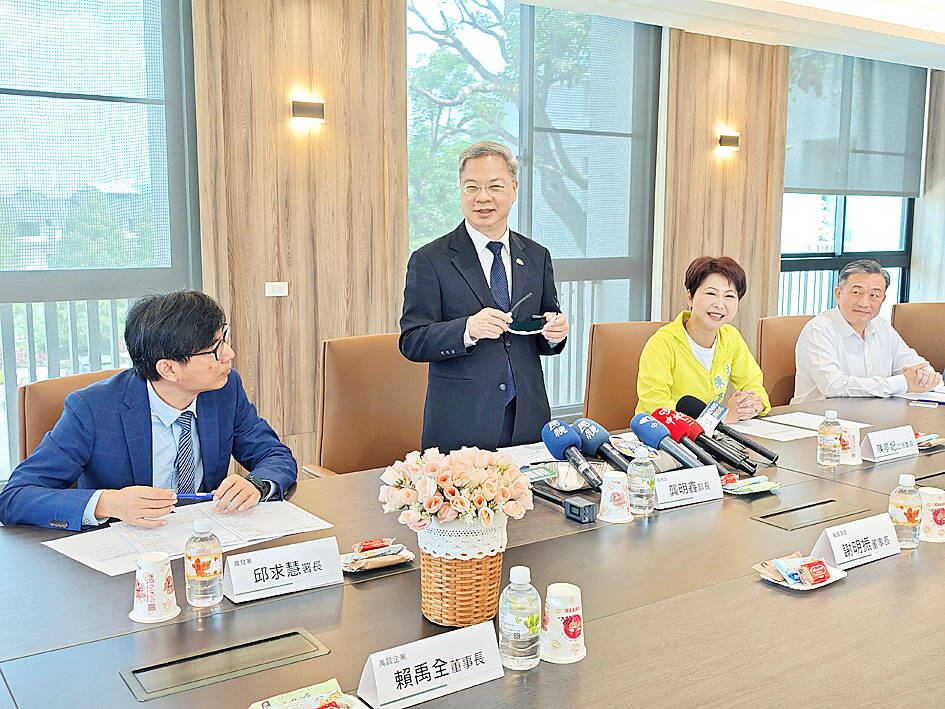The government is working with agencies to address issues including labor shortages, financial support and structural transformation, Minister of Economic Affairs Kung Ming-hsin (龔明鑫) said yesterday during his meetings with representatives from traditional sectors like screw makers.
As labor shortages are a top concern for traditional sectors, the ministry is focusing on training workers to help manufacturers upgrade their technology, Kung told reporters after meeting in Tainan with representatives of the plastics industry.
“As we know, the Ministry of Labor already has a plan to address that, we passed it on to representatives to reassure them,” he said.

Photo: Wu Chun-feng, Taipei Times
Representatives are concerned about US tariff negotiations and New Taiwan dollar fluctuations against the US dollar, and the government has prepared financial support, including loans that companies can apply for, Kung said.
A single company can apply for at least NT$5 million (US$162,718) for research and development or upgrades, and joint applications involving multiple firms can reach NT$40 million, he said.
For expanding sales channels, a single company can apply for up to NT$5 million in loans, while joint applications can reach NT$20 million, he added.
There have been nearly 100 loan applications for financial support, about 236 applications for research and development or upgrades, and about 300 applications for expanding sales channels, the most among the categories, he said.
Another NT$20 billion could be added to the budget to support industrial development, he said.
Kung also met with representatives of the fastener industry in Kaohsiung yesterday in an effort to help them navigate headwinds after the US in June doubled tariffs on imported steel to 50 percent from 25 percent under Section 232 of its Trade Expansion Act of 1962.
The government has secured an agreement from banks that financial support would not be withdrawn when needed, Kung said in a speech before the meeting.
Representatives asked about the possibility of setting up an industrial park or cluster in Kaohsiung, and the ministry would work with the city government to find a suitable site, Kung told reporters after the meeting.
Representatives also suggested that local companies consider mergers, including with international channels, to streamline distribution, he said.
Kung said he hopes the legislature would pass draft amendments approved by the Executive Yuan to the Business Mergers and Acquisitions Act (企業併購法), so that companies would be temporarily exempt from additional taxes on mergers.

Taiwan’s long-term economic competitiveness will hinge not only on national champions like Taiwan Semiconductor Manufacturing Co. (TSMC, 台積電) but also on the widespread adoption of artificial intelligence (AI) and other emerging technologies, a US-based scholar has said. At a lecture in Taipei on Tuesday, Jeffrey Ding, assistant professor of political science at the George Washington University and author of "Technology and the Rise of Great Powers," argued that historical experience shows that general-purpose technologies (GPTs) — such as electricity, computers and now AI — shape long-term economic advantages through their diffusion across the broader economy. "What really matters is not who pioneers

In a high-security Shenzhen laboratory, Chinese scientists have built what Washington has spent years trying to prevent: a prototype of a machine capable of producing the cutting-edge semiconductor chips that power artificial intelligence (AI), smartphones and weapons central to Western military dominance, Reuters has learned. Completed early this year and undergoing testing, the prototype fills nearly an entire factory floor. It was built by a team of former engineers from Dutch semiconductor giant ASML who reverse-engineered the company’s extreme ultraviolet lithography (EUV) machines, according to two people with knowledge of the project. EUV machines sit at the heart of a technological Cold

Taiwan Semiconductor Manufacturing Co (TSMC, 台積電) last week recorded an increase in the number of shareholders to the highest in almost eight months, despite its share price falling 3.38 percent from the previous week, Taiwan Stock Exchange data released on Saturday showed. As of Friday, TSMC had 1.88 million shareholders, the most since the week of April 25 and an increase of 31,870 from the previous week, the data showed. The number of shareholders jumped despite a drop of NT$50 (US$1.59), or 3.38 percent, in TSMC’s share price from a week earlier to NT$1,430, as investors took profits from their earlier gains

TAIWAN VALUE CHAIN: Foxtron is to fully own Luxgen following the transaction and it plans to launch a new electric model, the Foxtron Bria, in Taiwan next year Yulon Motor Co (裕隆汽車) yesterday said that its board of directors approved the disposal of its electric vehicle (EV) unit, Luxgen Motor Co (納智捷汽車), to Foxtron Vehicle Technologies Co (鴻華先進) for NT$787.6 million (US$24.98 million). Foxtron, a half-half joint venture between Yulon affiliate Hua-Chuang Automobile Information Technical Center Co (華創車電) and Hon Hai Precision Industry Co (鴻海精密), expects to wrap up the deal in the first quarter of next year. Foxtron would fully own Luxgen following the transaction, including five car distributing companies, outlets and all employees. The deal is subject to the approval of the Fair Trade Commission, Foxtron said. “Foxtron will be